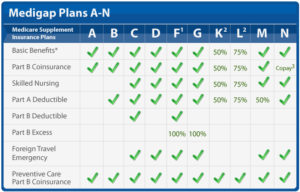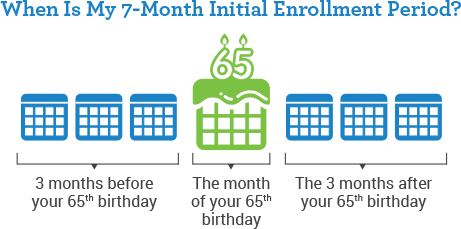I spend most of my days answering Medicare questions. That is the biggest part of my job and is one that I enjoy immensely. Educating Medicare beneficiaries and soon-to-be Medicare beneficiaries is rewarding in that I get the opportunity to illuminate confusing aspects of the mysterious, overwhelming world of Medicare. With that in mind, I’ve compiled a list of the top 10 Medicare questions that I have received:
1. How Do I Sign Up for Medicare?
As with most of these Medicare questions, the answer is dependent on your particular situation. If you are already receiving Social Security, you will be automatically enrolled in Medicare Parts A and B when you turn 65. You should receive a “Welcome to Medicare” packet and a red, white and blue Medicare card 2-3 months prior to the month that you turn 65. You do not have to take any action to enroll in Medicare. It will start the 1st day of the month that you turn 65.
If you are NOT receiving Social Security but DO want to enroll in Medicare, you will need to proactively enroll in Medicare Part B (you’ll be automatically enrolled in Part A). To sign up for Part B, your options are to go to a local Social Security office or to call Social Security at 800.772.1213. Alternatively, you can enroll for Medicare online.
2. How Much Does Medicare Cost?
Again, the answer is dependent on your situation. There is no cost for Medicare Part A (hospital) as long as you have worked 40 quarters/10 years in your working life, thereby paying into “the system” through payroll taxes.
For Part B, there is a premium. For 2017, the standard Medicare Part B premium is $134/month. This is typically taken as a deduction from your Social Security check.
There are, however, certain situations that could cause you to pay more or less for premiums. These situations are largely dependent on your income as reported by the IRS from two years ago. This is called the Income-Related Monthly Adjust Amount (IRMAA). Medicare has more information about IRMAA here.
Also, if you have been on Medicare for a few years, you may be “grandfathered in” to a lower premium amount, which could be between $104 and $134, depending on what year you started Medicare and your specific situation.
Receive an Email with the Lists of Medigap Costs for Your Zip Code
Where should we email the list of plans?
[si-contact-form form=’6′] I hate spam too, so I will never send such to you!3. Does Medicare Cover Preventive Care?
Contrary to popular misconception, Medicare does cover a good bit of preventive care now. This article details specifics about Medicare’s coverage of preventive care.
In general, Medicare covers a “Welcome to Medicare” physical within the first 12 months of going on Medicare. After that, it covers an annual wellness exam and many other screenings/tests on Medicare-established schedules. These include, but are not limited to, bone mass measurements, cardiovascular screenings, breast cancer screenings, colorectal cancer screenings, glaucoma tests, flu shots, lung cancer screenings, prostate cancer screenings, and many more.
4. What is the Difference in Medigap and Medicare Advantage?
These are the two options you have when you go on Medicare. It is very important to understand the differences, as there are many and they are significant. In general, Medigap plans supplement Medicare, whereas Medicare Advantage plans take the place of Medicare. Medicare Advantage is a “privatized” version of Medicare.
Typically, Medicare Advantage plans have lower premiums in exchange for a lower level of coverage and more restrictions (i.e. networks, annual plan changes, pre-approvals, etc).
The other big consideration is that you have to be approved to get a Medigap plan if you are not in your initial open enrollment period or a valid “guaranteed issue” period. This makes your initial selection important, as you can be “stuck” on an Advantage plan unable to “qualify” for a Medigap plan if you have pre-existing conditions.
Get an Email with the Lists of Medigap Plans/Costs Available in Your Zip Code
Where should we email the list of plans?
[si-contact-form form=’6′] I hate spam too, so I will never send such to you!5. Do I Have to Get a Part D (Rx coverage) Plan?
This is one of the Medicare questions for which you will receive a wide variance in answers.
The short answer is “No”. However, if you elect not to get a Part D plan, you will be subject to the Part D late enrollment penalty if/when you sign up for it at a later time. This penalty is 1% of the standard Part D premium per month that you did not have a plan. So, if you wait 5 years to sign up for a Part D plan, you’ll pay 60% more than someone else who didn’t wait.
With this in mind and with the consideration that Part D plans start at $15-20/month in most markets, it’s not a bad idea to get a plan when you are first eligible regardless of whether you “need” it at the time or not.
6. How Do I Decide Which Part D Plan to Get?
If you are not on any/many medications, you may want to base the Part D decision primarily on the plan premiums. In other words, if you are buying a Part D plan solely to avoid the Part D late enrollment penalty, you can base your decision on the cost of the plan and upgrade later if your needs or the plan changes.
If, however, you are like most people over age 65, you take some medications. In that case, it is crucial to compare the plans based on your specific medications. Co-pays can vary dramatically from one plan to another for the exact same medication. The Medicare.gov website has a Part D comparison tool that enables you to do this very easily by entering your zip code, medications and preferred pharmacy. If you are one of our clients, we can provide this comparison information for you.
7. Which is the Best Medigap Company or Plan?
Once you get your Medicare questions answered, you may be ready to move on to discussing Medigap plans. Everyone wants the most coverage for the least amount of money, obviously. With Medigap plans, that is relatively easy to find because the plans are Federally-standardized. Coverage with one company is the exact same as coverage with a different company for a “like” plan (i.e. one Plan F is the exact same as another Plan F with the only difference being premium and company reputation).
So, “best” company is a function of price since all other comparative factors are the same with Medigap plans. So to find out what is the best Medigap plan for you, get Medigap quotes from an independent broker. Compare the prices and company reputations/ratings and make an informed choice.
8. What Doctors Will Take My Medicare Supplement Plan?
This question is related to #7. With Medicare Supplement (Medigap) plans, you can go to any doctor or hospital nationwide that accepts Medicare patients. There are no networks on Medicare Supplements (Medigap plans), so if your doctor takes Medicare (your primary coverage), he or she will also take your Medicare Supplement.
Do not confuse this with Medicare Advantage plans – many people call those plans Medicare Supplements although they are not. Those plans have networks and are either PPOs or HMOs.
9. Why Do I Have to Answer Medical Questions to Get a Medigap Plan?
This has been one of the Medicare questions that is increasing in frequency since the passage of the Affordable Care Act (ACA), which eliminated pre-existing conditions as a way to exclude people from getting a health care plan.
However, the ACA did not/does not apply to Medicare or Medigap plans. Since Medigap plans are supplemental in nature, they are not affected by the legislated reforms. Generally speaking, any time you change Medigap plans or enroll in a plan outside of your initial open enrollment window you do have to “qualify medically” by answering health questions.
10. What is the Best Way To Enroll in a Medicare Supplement Plan?
I’m glad you asked! Seriously, enrolling in a Medicare Supplement/Medigap plan is easier than ever. The first step is comparing the plans/rates for your area. Rates are based on zip code, gender and age. Whether it is us or someone else, it is highly advisable to use an independent Medigap agent to compare multiple options in a centralized place. This does not cost you anything but can save you hundreds of dollars a year as well as giving you a direct representative to contact if you ever have any problems or questions.
__________________
Was your question not covered? Have other follow-up questions? Secure Medicare Solutions is a leading, ![]() independent brokerage that has been in business for 10 years, working with thousands of Medicare beneficiaries on these questions and more. Contact us online, click the button to the right, or call us at 877.506.3378.
independent brokerage that has been in business for 10 years, working with thousands of Medicare beneficiaries on these questions and more. Contact us online, click the button to the right, or call us at 877.506.3378.




